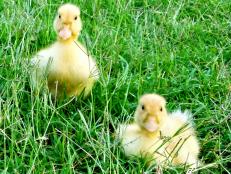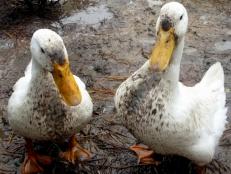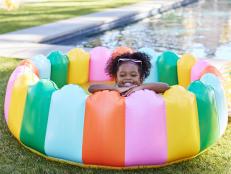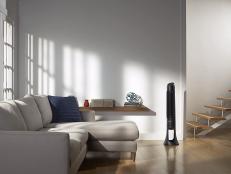How to Keep Ducks Cool in the Heat of Summer
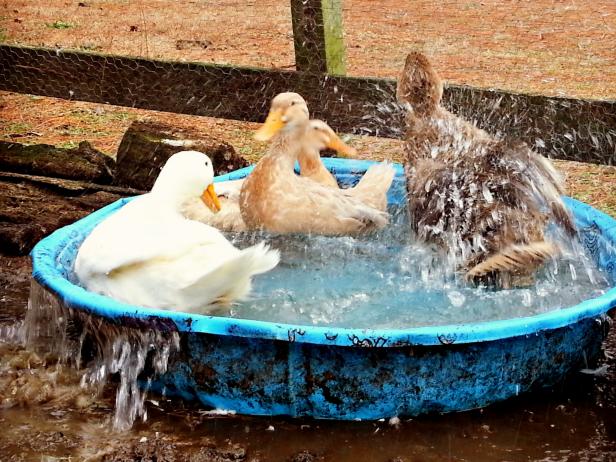
Photo by Lisa Steele
Ducks generally handle summertime heat fairly well, as long as they have plenty of shade and water. However in excessive heat, ducks, and more specifically ducklings, can suffer heat stroke, so watch for signs over overheating such as panting, holding their wings out from their bodies or droopy wings, standing or sitting with their eyes closed, laying on their side not moving or in obvious distress. Any duck you suspect is suffering from heatstroke should be moved immediately inside to a cool spot and then placed with their feet in a tub of cold water. Offering some sugar water or electrolytes, such as plain pedialyte, can also help an ailing duck.
Here are a few tips to help your ducks stay comfortable in the summer heat:
Cool, Clean Water
Eggs are mostly water, and the process of laying eggs siphons much of the fluid your ducks drink from their bodies into their eggs, so access to plenty of water is critical in the summer. Set out more water tubs than usual and place them in the shade. Adding ice cubes or frozen water bottles to the tubs will help keep the water cooler longer. Your ducks will most likely stand in the water tubs to cool off their feet, which is fine. They’ll still drink the water, but plan on refilling the tubs more often in the summer than at other times of the year.
Provide a Swimming Pool
Your ducks will love splashing or floating around in a pool when the mercury rises. You can use a plastic kiddie pool, horse trough, repurposed garden tub, other large container - or even just a depression in the ground filled with water. Although it’s nearly impossible to keep a duck pool clean, water stagnates quickly in the heat and bacteria can lead to botulism, so plan on refilling the pools daily, dumping out the water each evening and scrubbing the pool with white vinegar and rinsing it out well before refilling. Don’t forget to treat your ducks to a squirt from the hose while you’re filling the pool!
Offer Shade
Shade is extremely important, especially in the middle of the day when the sun is hottest. You will notice your ducks will find a nice shaded spot to nap and conserve their energy during the hottest part of the day. A shade screen or partially covered pen is a good idea, as is a raised house they can nap underneath. Shrubs or small bushes around the perimeter of your duck run is a natural way to give your ducks a place to relax out of the sun's rays.
Feed Later In the Day or Overnight
You will notice that your ducks eat far less in the summer than the winter. You can help them by putting out their feed in the very early morning and then again just before dark - or even leaving them feed and water overnight so they can eat when the temperatures are the coolest.
Offer Water-Dense Treats
Scratch, cracked corn, oats and other grains can raise body temperatures, so save those treats for the colder months. Excellent summertime treats include chilled watermelon, lettuce, sliced cucumbers, peas, blueberries or sliced strawberries. Toss the berries and peas in your ducks’ water tub for a fun treat for them. Mint naturally lowers body temperatures so freezing some fresh mint leaves into ice cubes and adding them to the water will also help your ducks stay cool.
Provide Well-Ventilated Night Shelter
Be sure that your duck house has plenty of cross-ventilation. Even better, let your ducks sleep outside in an attached night run, preferably inside your main run, but only if the run is 100% predator proof which means ½” welded wire fencing to prevent raccoons from reaching through to grab your sleeping ducks or weasels, rats or minks from squeezing through the fencing. The night run must be covered and the fencing sunk into the ground to prevent digging predators. A predator-proof latch such as one with a deadbolt high enough that raccoons can’t reach it or a combination lock or carabiner is a must.
These tips will ensure that your ducks are comfortable and happy all summer long.






